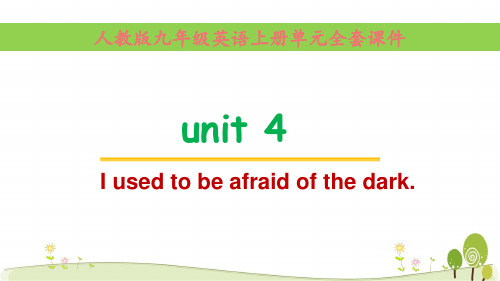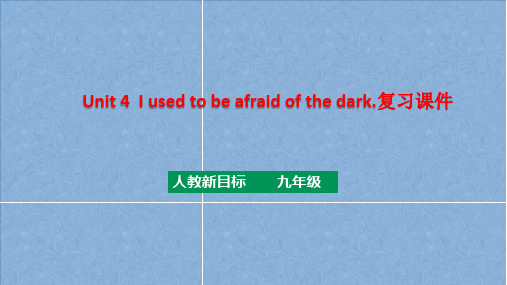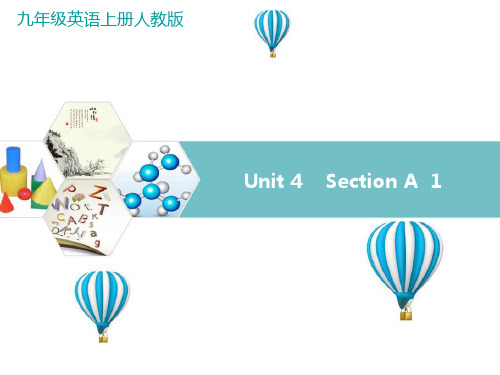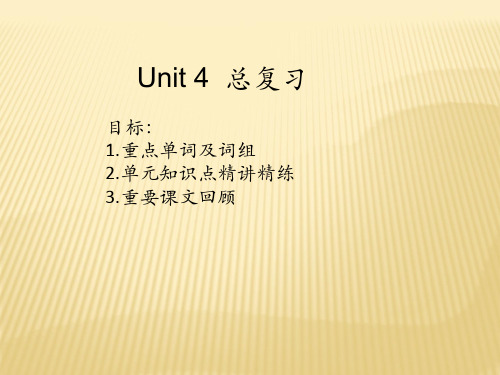最新九年级英语上册Unit4单元总复习课件 人教版
人教版九年级上学期英语课件: Unit4(共29张PPT)

9、要学生做的事,教职员躬亲共做; 要学生 学的知 识,教 职员躬 亲共学 ;要学 生守的 规则, 教职员 躬亲共 守。21.7.2721.7.27T uesday, July 27, 2021
10、阅读一切好书如同和过去最杰出的人谈话。09:08:4009:08:4009:087/27/2021 9:08:40 AM 11、一个好的教师,是一个懂得心理学和教育学的人。21.7.2709:08:4009:08Jul-2127-Jul-21 12、要记住,你不仅是教课的教师,也是学生的教育者,生活的导师和道德的引路人。09:08:4009:08:4009:08Tuesday, July 27, 2021 13、He who seize the right moment, is the right man.谁把握机遇,谁就心想事成。21.7.2721.7.2709:08:4009:08:40July 27, 2021 14、谁要是自己还没有发展培养和教育好,他就不能发展培养和教育别人。2021年7月27日星期二上午9时8分40秒09:08:4021.7.27 15、一年之计,莫如树谷;十年之计,莫如树木;终身之计,莫如树人。2021年7月上午9时8分21.7.2709:08July 27, 2021 16、提出一个问题往往比解决一个更重要。因为解决问题也许仅是一个数学上或实验上的技能而已,而提出新的问题,却需要有创造性的想像力,而且标志着科学的真正进步。2021年7月27日星期二9时8分40秒09:08:4027 July 2021 17、儿童是中心,教育的措施便围绕他们而组织起来。上午9时8分40秒上午9时8分09:08:4021.7.27
2、Our destiny offers not only the cup of despair, but the chalice of opportunity. (Richard Nixon, American President )命运给予我们的不是失望之酒,而是机会之杯。二〇二一年六月十七日2021年6月17日星期四 3、Patience is bitter, but its fruit is sweet. (Jean Jacques Rousseau , French thinker)忍耐是痛苦的,但它的果实是甜蜜的。10:516.17.202110:516.17.202110:5110:51:196.17.202110:516.17.2021 4、All that you do, do with your might; things done by halves are never done right. ----R.H. Stoddard, American poet做一切事都应尽力而为,半途而废永远不行6.17.20216.17.202110:5110:5110:51:1910:51:19 5、You have to believe in yourself. That's the secret of success. ----Charles Chaplin人必须相信自己,这是成功的秘诀。-Thursday, June 17, 2021June 21Thursday, June 17, 20216/17/2021
人教版英语九年级上unit4单元全套优质课件

Listen again and complete the exercise.
Conversation 1 Bob is here with his __p_a_r_e_n_t_s____ and he hasn't seen Mario for __fo_u__r___ years.
Conversation 2 Amy used to be really tall because Bob was ___s_h_o_r_t __ in the past.
3. If you're happy, you can find your changes.
Look at the pictures and describe the people.
What does he/she look like?
short/ brown hair 短/棕色头发
long /black hair 长/黑头发
1. Mario used to be__sh_o_r_t_ . He used to wear_g_l_a_ss_e_s_.
2. Amy used to be__t_a_ll____. She used to have __sh_o_r_t__hair.
3. Tina used to haver_e_d___ andc_u_r_ly___ hair.
➢Make sentences
He/She used to be/have/wear…, but now he/she is/has/wears ….
short/tall
young/old
heavy/thin
➢ change in personality
V S
【新】人教版九年级英语(全一册)上册第四单元《Unit4》整单元完整优质PPT教学课件(共4课时)

1c Look at the picture in 1a and make conversations.
A: Did Mario use to be short? B: Yes, he did. He used to be really short. A: What’s he like now? B: He’s tall now.
结构一样。 如果答语是肯定的,用“Yes +肯定结构”。 如果答语是否定的,用“No +肯定结构”。
-- He enjoys dancing, doesn’t he? 他喜欢跳舞,对吗?
--Yes, he does. / No, he doesn’t. 是的,他喜欢。/不,他不喜欢。
2) 回答陈述部分为否定句的反义疑问句时, Yes或是No的汉语意思与它们本身的词义相反。 --You didn’t go to work, did you?
Gina: Did he use to wear glasses? Alfred:Yes, and he used to be thin, too. But
look how big and strong he is now! Gina: He’s so popular now. Look at
all the girls around him!
medium build
handsome medium height
Personality
(性格)
outgoing
funny friendly
shy
hard-working
honest serious
What does Tom look like?
He is tall and he has short black hair.
人教英语九年级全册 Unit 4 单元复习课件 (共31张PPT)

He studies harder than he used to.
Para 2
Tbheeapbrsoenbtlems : 1. Hisfruomnhappiness began to influence his schoolwork.
缺席,不在
He became less interested in studying. Sometimes he was absent from class and failed his examinations.
初中英语九年级
Unit 4 I used to be afraid of the dark.
Structure: used to
Topic: How we have changed
appearance personality
life
appearance
He used to be strong. He used to have long blonde hair.
Para 2
暂停2 分钟
The intofnlsuoefn+c可e数of her changes:
1. 2.
SSahlhleet“名h数许die词si名多dt复a词,inmb数’,大tlee/u表量.不st示的oe可”_toat_rbb_abeo_veuce_ta,_lr_ep_表fao_u示npl_du_l_a__mr___e,_eb_tu_nt_en_wo_w_p_es_oh_pe_leg_ets
布朗夫人以前夏天不去旅游。
(3) Did he use to play the guitar?
他以前弹吉他吗?
(1)used to do sth.意为“过去常做某事”,只用于过去时态。 (2)be/ get used to (doing) sth.意为“习惯于(做)某事”,可用于现
人教版英语九年级全册Unit4复习课件

2. What’s he like now? 他现在什么样子? What +be +主语+like? 用来询问某人的外 貌特征,意为“…长什么样?”,相当于what do /does +主语+like? ►---What’s your brother like?=What does your brother like? 你哥哥张什么样? 辨析:be like 和look like be like: “像…一样”,常指品德、相貌等相像 ,
= I don’t know what they do with the problem.
2) 动词不定式短语 to deal with 后必须带宾语。 ► I don’t know how to deal with it.
我不知道如何处理这件事。
(3)shyness 名词,意为“害羞;腼腆”是形 容词shy 加后缀-ness 构成的名词。 ► He can’t get over his shyness. 拓展:sad -------- sadness
in the front of :“在…… 的前部”,强调在某一 物体内部的前面
(3)whole 形容词,意为“整个的;全部的”,常 用结构为“the+whole+单数名词”。all也有 此意,但语序不同:all用于冠词、所有格 或其他限定词之前;whole用于冠词、所有 格及其他限定词之后。
all the time
Grammar Focus
I used to be short
I didn’t use to be popular in school.
Paula used to be really quiet.
人教版九年级英语上册unit 4单元课件(190张PPT)

short He used to 1. Mario used to be ______. glasses wear _______. 2. Amy used to be _____. tall She used to have short hair. _______ red and _____ curly hair. 3. Tina used to have _____
1c
Look at the picture in 1a and make conversations. Yes, he did. He used to be really short.
Did Mario use to be short?
What’s he like now?
He’s tall now.
I know, She’s so active now.
Read the conversation and 2d complete the blanks.
Bill has changed so much! He used to be ____ _____. His face always turned ______ shy and quiet red ___ when he talked to girls! He studied scores on his exams. hard and got good ______ big He used to be ____, thin but now he is ___ strong and _______.
silent adj. → silence
e.g. Peter seems silent today. What’s the matter? 彼特今天似乎很沉默,怎么了?
人教版英语九年级全册Unit 4-Unit 6复习课件

3. humorous adj. 有幽默感的,滑稽有趣的 变形: humor n.幽默
4.silent adj. 不说话的,沉默的 remain/stay/keep silent 保持沉默 in silence 安静地,无声地=silently n.silence 5.helpful adj.有用的,有帮助的,乐于助人的 be helpful to sb. 对某人有帮助
6.general adj.总的/普遍的/常规的 n. 将军---generally adv.一般地/普遍地 in general =generally speaking 一般来说
7.introduction n.介绍 brief introduction 简介 make an introduction 做介绍 introduce oneself自我介绍 introduce A to B 把A介绍给B
14. in the last /past +时间段 在过去的...里 15. be there for 随叫随到;不离……左右
U5背诵知识点
• chopsticks [ˈtʃɒpstɪks] n. 筷子 two pairs of chopsticks • coin [kɔɪn] n.硬币 corner n.角落 • fork [fɔ:k] n.餐叉 a knife and fork 一副刀叉(做主谓单) • a knife and a fork 一把刀和一个叉(做主谓复) • blouse [blaʊz] n.(女士)短上衣;衬衫 • silver [ˈsɪlvə] n. 银,银器; adj.银色的 silver hair银发 gold金 • glass [glɑːs] n.玻璃 玻璃杯 a piece of glass a glass of一杯.. • 眼镜 a pair of glasses • cotton [ˈkɒtn] n.棉;棉花不可数,mutton 羊肉不可数 • fair [feər] n. 展览会;交易会 • environmental [ɪnˏvaɪərənˈmentl] adj. 自然环境的;有关环境的
人教版九年级英语 Unit4 复习课件 (共15张ppt)

目标: 1.重点单词及词组 2.单元知识点精讲精练 3.重要课文回顾
Task 1: 请同学们翻到P159页,自读单词,然后听写。
Task 2: 词汇联想:
silent (adj.)---- n._s_i_le_n__c_e
helpful (adj.)---- v.&n._h_e_l_p_
3. deal with; do with处理,解决 deal—dealt—dealt, 同义短语为do with
deal with 与疑问词how连用,do with与疑问词what连用 eg. I don’t know how to deal with the problem.
=I don’t know what to do with the problem. 4. It is /has been + 时间 + since 从句 例如:It’s /has been three years since we met last. 自从我们上次 见面已有三年了。 5. fail 失败 fail (in) the exam 考试不及格; pass the exam通过考试
African----非洲_A__f_r_i_c_a__
British----英国__B_r_it_ia_n_/England examination----(缩写)_e_x_a__m_ v._e_x_a_m__i_ne exactly (adv.)----adj._e_x__a_c_t_ pride----adj._p_r_o_u_d__
he have short hair? Yes, he
No, he
反意疑问句:
She used to be shy,_____ _____? /
- 1、下载文档前请自行甄别文档内容的完整性,平台不提供额外的编辑、内容补充、找答案等附加服务。
- 2、"仅部分预览"的文档,不可在线预览部分如存在完整性等问题,可反馈申请退款(可完整预览的文档不适用该条件!)。
- 3、如文档侵犯您的权益,请联系客服反馈,我们会尽快为您处理(人工客服工作时间:9:00-18:30)。
1. … you used to be short, didn’t you?(P25)本句是个反义疑问句,反义疑问句的特点是“前肯后否”或“前否后肯”。
回答反义疑问句和回答一般疑问句一样,如果答案是肯定的,用Yes+肯定结构;如果答案是否定的,用No+否定结构。
He can hardly stay awake because he is so tired. _______?A. does heB. isn't heC. can't heD. can he1. He _______ listen to pop music, but now he _______ dancing.A. is used to; used toB. use to; is used toC. used to; is used toD. used to; used to2. He used to _______ in the sun, but now he is used to _______ at night.A. read; readB. reading; readC. read; readingD. reading; reading3. He used to be short. (改为一般疑问句)__________ he__________ to be short?4. Her father used to get up late. (改为否定句)Her father__________ __________ to get up late.5. She______live alone. But she______living alone because she feels lonely.A. used to; doesn't used toB. is used to; was used toC. used to; is not used toD. was used to; doesn't used to2. What’s he like now? (P26)What's sb like “某人什么样?”或“某人是什么样的人?”,多用于提问人的性格、品质等,也可用于提问人的相貌。
What does sb look like?用于提问人的外貌,“某人长得什么样?”--- ______ is your classmate John like?--- He's very tall.A. HowB. WhatC. WhoD. Which3. She was never brave enough to ask questions. (P26)enough此处用作副词,“足够地,充足地”,用来修饰形容词或副词,置于被修饰词之后。
enough还可用作形容词,“足够的,充足的”,在句中作定语修饰名词,可置于名词前面或后面。
All the students in the classroom do their homework __________.A. enough carefulB. careful enoughC. enough carefullyD. carefully enough3. She was never brave enough to ask questions. (P26)adj./adv. + enough to do sth.“足够……可以做某事”。
so...that..., ...enough to ... 与 too...to...可以进行同义句转换。
The man is so old that he can't go to work.= The man isn't young enough to go to work.= The man is too old to go to work.4. It’s been three years since we last saw our primary school classmates.(P26) It is/has been +时间段+since从句 “自从……以来已经有多长时间了”。
since“自从,自……以来”,后接从句时,该从句常用一般过去时,主句常用完成时,且动词要用延续性动词。
My uncle has been teaching in this school _______ he was twenty years old.A. sinceB. forC. untilD. after5. Candy told me that she used to be really shy and took up singing to deal with her shyness. (P27)take up “开始;从事”。
take up doing sth “开始做某事”。
Jacky's mother was surprised to see her son ______ all the food on the table quickly.A. eat upB. look upC. take upD. give up5. Candy told me that she used to be really shy and took up singing to deal with her shyness. (P27)take off 脱掉;起飞 take away 拿走take in 吸收,领会 take down 记录;取下take back 收回 take out 带出;清除take pride in 以…为自豪 take the place of 代替…take turns to do 轮流做…5. Candy told me that she used to be really shy and took up singing to deal with her shyness. (P27)deal with“处理”,与how连用。
do with “处理”,与what连用。
deal with还意为“应付,涉及,论及”1. Jane is very busy these days, for she has a lot of problems to ______.A. deal withB. agree withC. keep up withD. come up with5. Candy told me that she used to be really shy and took up singing to deal with her shyness. (P27)2. — ________ did you ________ your pocket money?— I sent it to the children in Sichuan.A. What; deal withB. How; do toC. What; deal toD. How; deal with5. Candy told me that she used to be really shy and took up singing to deal with her shyness. (P27)3. 用deal with 或 do with填空。
Can you tell me how to _______ it?I really don’t know what to _______ it.4.用do with 和 deal with 翻译。
你怎么处理那台旧电视的?6. As she got better, she dared to sing in front of her class.(P27)1. I wonder how he ___ that to the teacher.A.dare to sayB.dare sayingC.not dare sayD.dared say2.The little girl ____ out in the dark at night.A.dares not goB.dare not goC.does not dare goingD.dares not to go6. As she got better, she dared to sing in front of her class.(P27)in front of与in the front ofin front of在……的前面强调在某一物体外部的前面in the front of在……的前部强调在某一物体内部的前面例:Cathy was just sitting in the front of the car when she saw her friend Mary standing in front of the car.7. ...you have to be prepared to give up your normal life. (P27)prepared 形容词,“准备好的” be prepared to do sth “准备好做某事”prepare to do sth.表示"准备做......"。
prepare 动词,“准备” prepare sb. sth. = prepare sth. for sb.“为…准备…” prepare for sth. “为……做准备”。
prepare sb. for sth.表示“使某人对某事有所准备”。
1. --- I find it difficult to learn English well. I want to drop it. --- English is very important in our daily life. Never _______.A. give up itB. give it upC. give away itD. give it away2. You shouldn't ______ your hope. Everything will be better.A. give upB. fix upC. cheer upD. put up3. You should really ______ smoking. It's a terrible habit.A. grow upB. pick upC. give upD. set up4. —What are you doing, Uncle Wang?—I am sorting out old books and I'll ______ to kids in West China. A. give them up B. give them awayC. give them offD. give them in5.— It's everyone’s duty to join the Clean Your Plate Campaign.— Sure. We should try to ______ all the food that we've ordered.A. give upB. eat upC. turn upD. show up8. being alone独处 (P28)alone形容词,“单独的,独自的”,不能用于名词前作定语。
